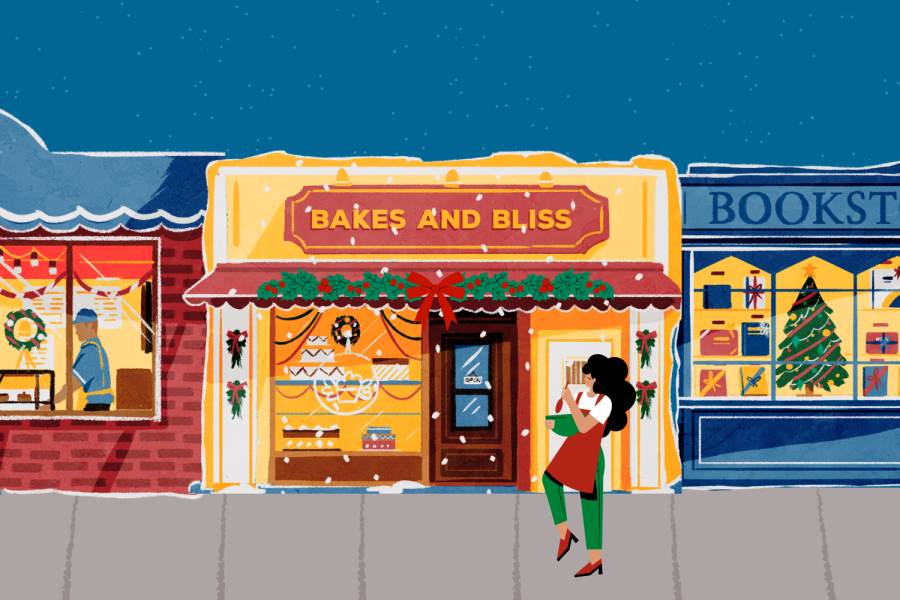As Thanksgiving break ends, the holiday season begins—and so do annual holiday festivities. One that many of us fall victim to is watching an endless list of cheesy Christmas movies.
While I always revisit some of my favorites, such as “Elf” and “The Santa Clause,” I also find myself begrudgingly watching several Hallmark holiday movies with my family. There is comedic value in the fact that all these movies are predictable to a fault. There’s a female lead with a busy job in a bustling city. She reunites with her family in her rural hometown, embraces the Christmas spirit and falls in love with the unlikely but destined love interest (probably a baker) and with the simple small-town lifestyle.
With the occasional addition of different love interests, magical powers and must-be-solved-by-Christmas dilemmas, this formula applies to most Hallmark movies—so much so that you can even find online bingo cards or drinking games to play during the movie viewing!
So why do we continue to watch these movies even though we can usually anticipate the plot line and always are hoping for more adventure and spice at the end? This year, I sat down and watched a Hallmark movie on Thanksgiving night to try to answer this question.
I watched “Next Stop, Christmas,” a take on “Back to the Future” starring Lea Thompson, who played Lorraine in “Back to the Future” and Christopher Lloyd, who also starred in the classic film as “Doc” Brown.
The main character, Angie, is an ambitious New York City surgeon who rarely sees her family. She decides to take a train to upstate Connecticut to see her family and falls asleep, waking up on an antique Christmas train that transports her back in time to Christmas 10 years ago. Here, she must revisit her actions and find out what she must correct about her life in order to travel back to the present.
The plot parallel to “Back to the Future” introduces surprising depth for the Hallmark brand. Lloyd’s character, the train conductor, even controls the portal for the train between the past and future much like how he controlled the portal in “Back to the Future.” Yet like any Hallmark holiday movie, “Next Stop, Christmas” is inundated with cringey jokes and poor acting that leave viewers longing for more.
After my Thanksgiving break “studies,” I now have a better understanding of why we choose to watch these predictable movies year after year. First, the cheesiness of these movies carries a sense of nostalgia. The festive settings, cozy hometowns and family traditions harken back to universal experiences that many of us had as children during the holidays. Second, the structure of each movie provides the stability we desperately need during the holiday season. In real life, holidays with family can be incredibly chaotic, yet there is a predictability to each movie. Lastly, these movies are the ideal escapist viewing material. With Hallmark movies, we can immerse ourselves in a perfect holiday fairytale that is unattainable in practice. There is always a resolution, even when our own lives are riddled with tensions and distance.
Yet there still is untapped potential for Hallmark to explore. Hallmark is moving in the right direction with diversity within their programs by increasing the number of leads who are people of color, people of different religious backgrounds and LGBTQ+ characters. But rather than creating a token diversity movie each year, the next step for Hallmark is to embed this ideology into their brand. In terms of plot, it was a pleasant surprise in “Next Stop, Christmas” that the protagonist doesn’t leave her life in the city like in several of its Hallmark counterparts. Instead, she stays in the city and persists in her ambitious surgeon role. However, this outcome is still a rare occurrence for Hallmark protagonists. A void exists within Hallmark of meaningful stories deeper than the run-of-the-mill Christmas love story. Where’s the story of the girl who ditches the toxic ex and ends up alone? The story of the tantrum-throwing kids whose parents finally tell them Santa isn’t real? The stories of children of divorce schlepping between Christmas dinners?
Hallmark still misses the mark when it comes to covering the full complexity of our lives. But maybe that is part of the appeal of Hallmark movies. Our own lives are hard enough, and viewers find comfort in their simplicity. For now, I’ll welcome my ironic Hallmark movie-viewing experience each time December rolls around and relish in the unrealistic holiday fantasies.




